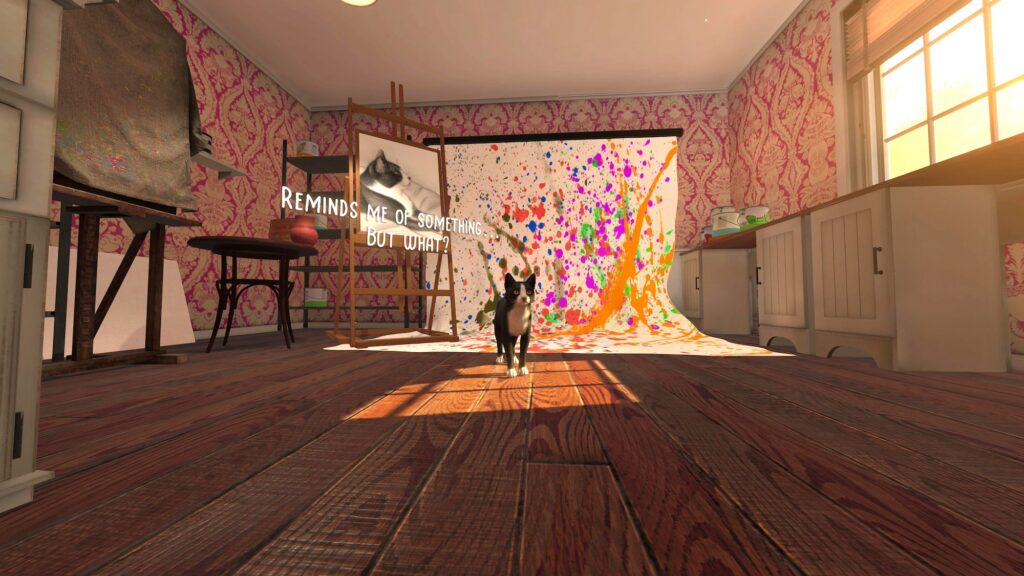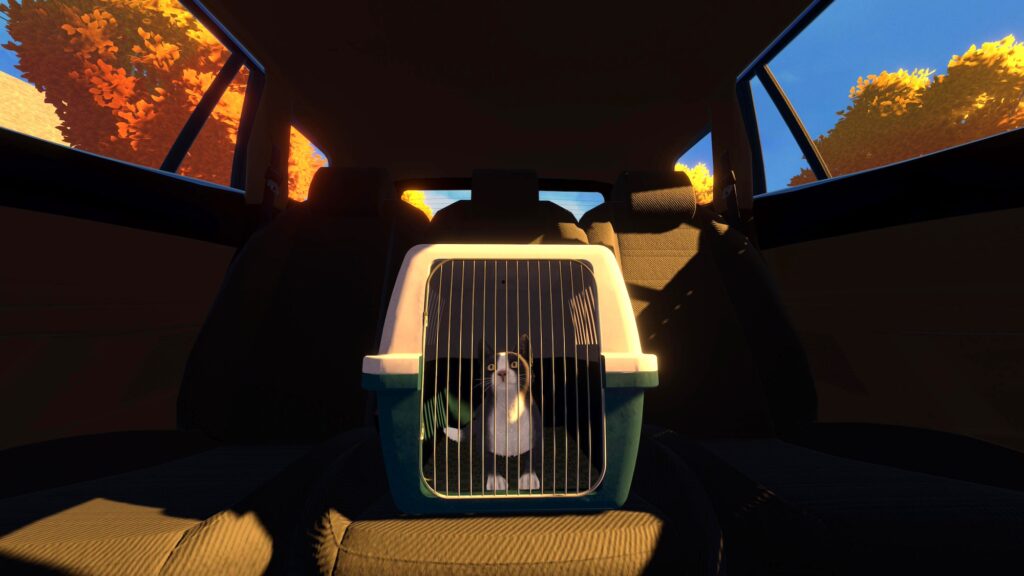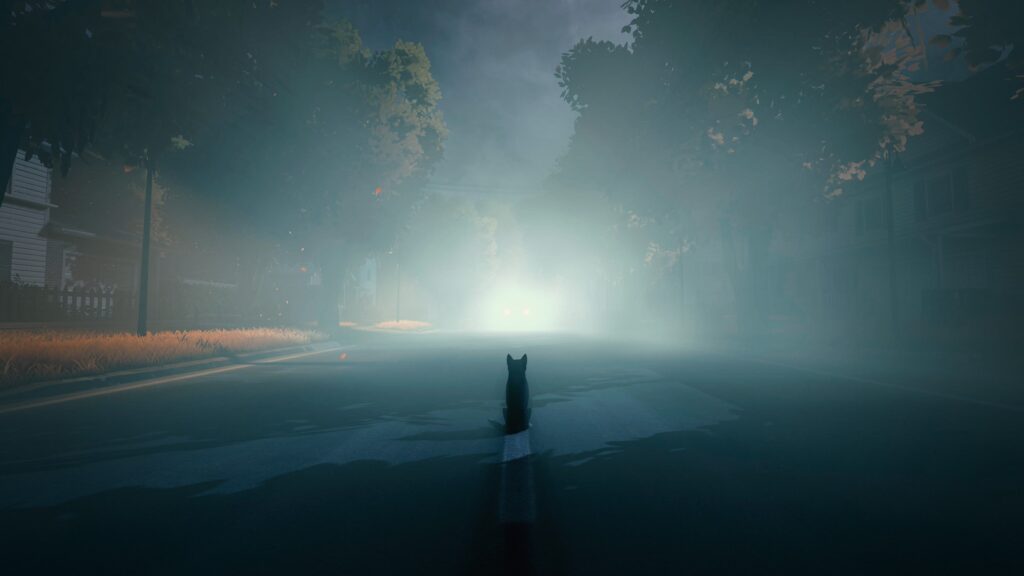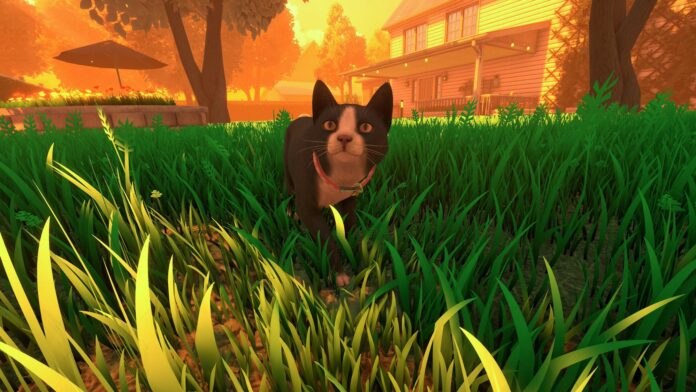Copycat, the debut game by Spoonful of Wonders, released on Steam in September 2024. Now the game is also released on Xbox and PlayStation 5. Enough reason to rerun our interview with the creators, originally published on 16 September 2024.
Copycat is an emotional, narrative-driven adventure starring Dawn, a recently adopted shelter cat who suddenly finds herself outsmarted by a sneaky stray with a plan to steal her life. As players help Dawn claw her way back home, they’ll unravel a tale filled with jealousy, identity, and the complex emotions that shape the human experience. Will her owner, Olive, recognise the real Dawn if she ever returns? How will she decide between the two cats? And in the end… could Dawn have been the copycat all along?
Copycat is the debut game from the Australian/Ukrainian duo Spoonful of Wonder. The indie studio was founded in 2022 by Kostia Liakhov, Game Director and Head of Art, and Samantha (Sam) Cable, Game Director and Head of Narrative. For the past eight years, they’ve worked together as an art director and writer duo in advertising, film, and animation. “But we both grew up playing games and realized we might just have the skills to pull it off,” says Sam Cable. “We switched careers and went full-time into game development.”
Inspired by the rising issue of pet abandonment, Cable wanted to write a script that demonstrates the complex and nuanced world of cat ownership. Copycat tells the story of a pet dealing with abandonment and a human forced to surrender. “The special bond we share with our cats (and dogs) is unlike any other relationship,” explains Cable. “The game delves into the unconditional love pets give us, whether on good days or bad, and how they’re there through both fun and tough times.”
Silent protagonist
Cable calls cats the perfect vessel to tell this emotional story. “We wanted players to walk in the paws of their newly adopted cat and experience the fear of adjusting to a new home.” By speaking with numerous pet owners during development, the team ensured the gameplay reflected the varied experiences of real-life pet ownership. Together, the game’s characters embark on a journey to discover the meaning of family and home.

Telling the three-act transformative narrative through the eyes of the silent protagonist required Cable and Liakhov to come up with solutions that would make the action flow while keeping the story accessible and enjoyable. “This is where we decided to combine the text pop-ups that reflect the character’s thoughts and opinions. With a Stanley Parable-esque nature documentary narrator that becomes an inner monologue of Dawn. These tools create a wonderful contrast and almost work like an angel and a devil on a character’s shoulders, guiding them when needed and then becoming their worst critic just moments later.”
This duality reflects another narrative technique the team employs – moral choices. “We wanted to have a mechanic to highlight that being a stray cat is not all fun and games. Players will face tough choices that are designed to help reflect on the player’s own moral compass.”
Colour conveys emotions
The visual style of Copycat is heavily inspired by the animated films of Pixar and Disney, focusing on how color and design can convey emotions. Bright, warm scenes emphasize happiness, while darker, greyer tones and wider camera angles highlight feelings of loneliness when things go wrong. This thoughtful use of visual cues helps immerse players in the emotional journey of the characters.
Choosing a semi-realistic, stylised look also allowed the two-person team to optimize the game’s performance across multiple platforms, including handheld devices. This approach made it easier to blend custom-made assets with 3D models from asset stores, saving time and effort without compromising quality.

The team’s creative process is all about collaboration and hands-on work, a habit they picked up from their days as a director and writer duo in advertising. “We both love the ideation phase and stayed there as long as possible,” says Cable. Having pitched projects for brands like Samsung, Canon, and McDonald’s, they’ve grown to enjoy the thrill of pitching, nerves and all. “We’re especially proud of our pitch for Copycat, even though we didn’t land a major publisher. For the next game, we will be more prepared and build on our experiences.”
Making games takes ages
Without the financial backing of a major publisher, the Spoonful of Wonder-team had to look elsewhere to get the game financed. “There is zero chance we would be where we are today without the funding and support of Screen Australia,” says Cable. “We are so grateful to the team: Amelia Laughlan, Chad Toprak and Lee Naimo.” The funding has been key to the game’s development, providing both a financial safety net and a jumpstart in the industry. It allowed them to pay their collaborators, including composers, voice actors, and coders. “We’re grateful for Australia’s support of the gaming industry and encourage all creatives to apply to Screen Australia to help bring their stories to life.”

For the first-time game creators, the development of Copycat has brought them many insights. The biggest lesson they’ve learned is that making games take a lot longer than you would expect. “From writing the script to writing code, to briefing actors and translators and composers, to communicating with streamers, there are so many balls we are juggling. Sometimes all at the same time as well,” Cable shares. “For us, it took us three and a half years, a year and a half longer than estimated. It is humbling to even make it this far! We have the finish line in sight, and we are so proud of the project we have created. We hope it touches the hearts of our players, too.”
Copycat is out now on Steam, Xbox and PlayStation 5.

